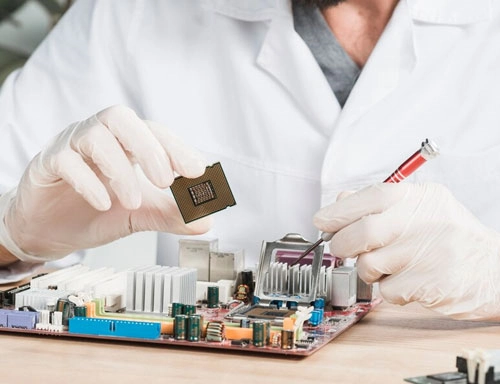
About the Course
VLSI, or Very-Large-Scale Integration, is a branch of electronics engineering that deals with the design, fabrication and manufacturing of chips or integrated circuits (ICs) that contain a very large number of transistors. The field of very-large-scale integration (VLSI) in India is currently experiencing rapid growth and development. There has been a significant increase in the number of companies and research institutions working in this area.
India now has: R & D centres for top 3 EDA companies (Cadence, Synopsys and Mentor Graphics), Top 2 Manufacturing companies i.e. TSMC and Samsung both has offices in India.
Additionally, the Indian government has also been investing heavily in the development of VLSI and related technologies, providing further support for the growth of this field in India. Taking VLSI as a base - Many of these professionals are involved in developing cutting-edge technologies such as artificial intelligence, the Internet of Things, and 5G communications.
The B.Tech. program in Electronics Engineering with a specialization in VLSI Design and Technology spans over four years, meticulously crafted to equip engineering graduates with comprehensive expertise in integrated circuit design, commonly referred to as chip design. This program is tailored to cultivate skilled graduates proficient in the essential aspects of VLSI Design crucial for careers in VLSI domain industries. Through this program, students will delve into semiconductor devices, VLSI circuit design and verification, FPGA design, and fabrication processes, gaining practical proficiency with leading Electronic Design Automation (EDA) tools. The enduring relevance of the VLSI domain lies in its applications across diverse sectors such as Communications, Signal & Image Processing, Space Research, and Automation Industry, where it plays a pivotal role in designing and verifying electronic systems and circuits.
Honours Degree Using MOOCs Platform Coursera/Infosys Springboard
Industry Certifications

More about department
Curriculum Details/Modules
Application Process
- Register on portal by filling & submitting Registration Form.
- Please take a note of Email ID and Phone Number used during registration.
- Email ID submitted at the time of registration will be used for all communication until application is completed.
- To login, enter phone number provided at time of registration, you will receive an OTP. Enter OTP to login.
- Once registered on portal, you can log into portal to start your application.
- You can always continue your application from where you have left.
- Affordable education with maximum learning
Vision
To be a renowned Center of Excellence in Electronics and Communication Engineering, developing globally competent ethical resources to serve society.
Mission
- To impart a robust teaching and learning process thriving on qualified, trained resources and state-of-the-art infrastructure.
- To promote innovation and research culture by providing students with hands-on experience for solving real-time problems and developing sustainable products and solutions.
- To imbibe ethical values, entrepreneurial zeal, and lifelong learning ability to develop future-ready professionals.
Program Educational Objectives (PEOs)
Program Outcomes (POs)
Engineering Graduates will be able to:
- Engineering Knowledge : Apply the knowledge of mathematics, science, engineering fundamentals, and an engineering specialization to the solution of complex engineering problems.
- Problem Analysis : Identify, formulate, review research literature, and analyze complex engineering problems reaching substantiated conclusions using first principles of mathematics, natural sciences, and engineering sciences.
- Design/Development of Solutions : Design solutions for complex engineering problems and design system components or processes that meet the specified needs with appropriate consideration for the public health and safety, and the cultural, societal, and environmental considerations.
- Conduct Investigations of Complex Problems : Use research-based knowledge and research methods including design of experiments, analysis and interpretation of data, and synthesis of the information to provide valid conclusions.
- Modern Tool Usage : Create, select, and apply appropriate techniques, resources, and modern engineering and IT tools including prediction and modelling to complex engineering activities with an understanding of the limitations.
- The Engineer and Society : Apply reasoning informed by the contextual knowledge to assess societal, health, safety, legal and cultural issues and the consequent responsibilities relevant to the professional engineering practice.
- Environment and Sustainability : Understand the impact of the professional engineering solutions in societal and environmental contexts, and demonstrate the knowledge of, and need for sustainable development.
- Ethics : Apply ethical principles and commit to professional ethics and responsibilities and norms of the engineering practice.
- Individual and Team Work : Function effectively as an individual, and as a member or leader in diverse teams, and in multidisciplinary settings.
- Communication : Communicate effectively on complex engineering activities with the engineering community and with society at large, such as, being able to comprehend and write effective reports and design documentation, make effective presentations, and give and receive clear instructions.
- Project Management and Finance : Demonstrate knowledge and understanding of the engineering and management principles and apply these to one’s own work, as a member and leader in a team, to manage projects and in multidisciplinary environments.
- Life-long Learning : Recognize the need for, and have the preparation and ability to engage in independent and life-long learning in the broadest context of technological change.
Program Specific Outcomes (PSOs)
- PSO1: To design and implement products using the cutting-edge software and hardware tools in Electronics and communication engineering to satisfy the Industrial needs.
- PSO2: To analyse and develop solutions for the real time problems and to apply the knowledge for innovative ideas and solutions in Telecommunications, Wireless Networking, Embedded Systems, and VLSI.
- PSO3: To demonstrate the technical skills, professional competence, entrepreneurial attitude to become competent professional for the society.

Apply Online for Admission to B. Tech In (VLSI)
You can apply online for admission to B. Tech In (VLSI) quite conveniently in a hassle-free way. For more information about the program, you can download the brochure below.








































